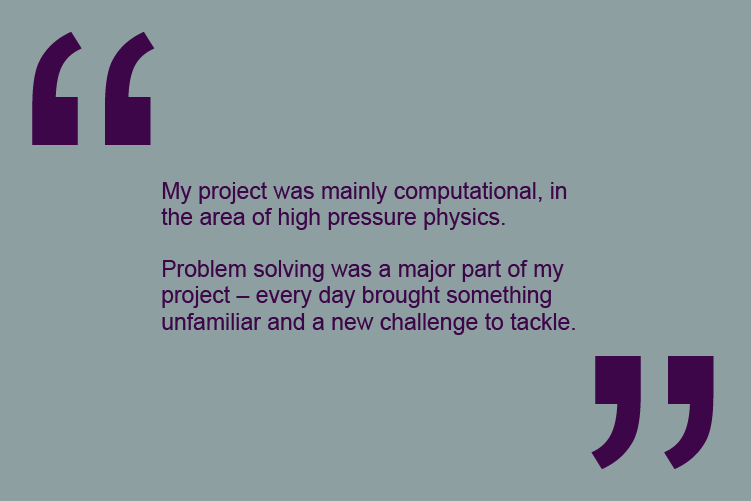After enjoying her Senior Honours project in the field of condensed matter physics, Catriona Roy had ambitions to continue work in that field for her MPhys project, with experience gained from her condensed matter summer internship being an ideal opportunity to develop and consolidate skills.
Why apply?
Since I thoroughly enjoyed my Senior Honours project last semester, I decided I wanted to stay in the field of condensed matter physics for my MPhys project and doing a summer project seemed like a great idea to continue building on my knowledge and skills in the meantime. My supervisor also suggested it would put me at an advantage to learn some of the skills I might need in advance.
What was my project about?
My project was mainly computational, in the area of high pressure physics. We’re interested in studying hard materials under extreme conditions – high temperatures and high pressures. We do this experimentally, for example using a diamond anvil cell to squash a tiny sample between two diamonds to reach high pressure, then using x-ray diffraction in a synchrotron to study it. But we also want to model the behaviour mathematically, to calculate the pressure given if we know the volume and temperature, and vice-versa (using equations of state, like PV = nRT, but ones a bit more complicated!) In my project, I wrote a Python module that can fit data to a model and use it to calculate a host of properties like heat capacity and bulk modulus. I hope my code will be useful for the researchers in my lab and maybe even further afield.
Skills I developed
Problem solving was a major part of my project – every day brought something unfamiliar and a new challenge to tackle. I became much more fluent with writing Python and learnt how to use Git and GitLab to collaborate with others with my code. And I had the chance to learn some brand new, more specialised skills too, like how to load a diamond anvil cell (patience and a steady hand required) and gaining a deeper understanding of equations of state and what goes into the theoretical side of high pressure physics.
Advice for students
If you the idea of research excites you, go for it! Don’t worry if you feel like you don’t know enough about your area of interest to be able to do a full independent project – you will learn a lot along the way, which is the best way to learn. Your supervisor and maybe others in their research group will be there to teach you and help you.
Further information
Learn more about the School of Physics and Astronomy’s Career Development Summer Scholarship Programme: SoPA Summer Programme



